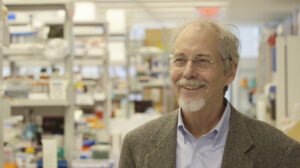Translating single-cell microfluidics from academic lab to global biotech impact
We’re honoured to welcome Dr Carl Hansen, CEO & Co-Founder of AbCellera, for a special research seminar
Events
Calendar

- This event has passed.
Research Seminar: Scaling up genome engineering in yeast and mammals – Dr. Jef Boeke
April 4, 2024 @ 11:00 am - 12:00 pm PDT
Research Seminar: Scaling up genome engineering in yeast and mammals – Dr. Jef Boeke
Seminar Abstract
Rapid advances in DNA synthesis techniques have made it possible to engineer diverse genomic elements, pathways, and whole genomes, providing new insights into design and analysis of systems. The synthetic yeast genome project, Sc2.0 is well on its way with the 16 synthetic Saccharomyces cerevisiae chromosomes now completed by a global team. The synthetic genome features several systemic modifications, including TAG/TAA stop-codon swaps, deletion of subtelomeric regions, introns, tRNA genes, transposons and silent mating loci. Strategically placed loxPsym sites enable genome restructuring using an inducible evolution system termed SCRaMbLE which can generate millions of derived variant genomes with predictable structures leading to complex genotypes and phenotypes. The fully synthetic yeast genome provides a new kind of combinatorial genetics based on variations in gene content and copy number. Synthetic chromosome IV is the largest in the genome in terms of bp synthesized at over 1.4Mb. We have created “inside out” and nuclear envelope-directed versions of this chromosome. Remarkably, the 3D structures of synthetic and native chromosomes are very similar despite the substantial number of changes introduced.
Chromosome I is the smallest S. cerevisiae chromosome, and anticipating issues of instability related to its small size, we decided to fuse it to other chromosomes – and were surprised by how easy it was to do this. This led to larger questions about whether it would be possibly to radically reduce chromosome number by continuing to fuse chromosomes. We completely re-engineered the yeast karyotype, by systematically fusing pairs of telomeres and deleting single centromeres, generating an isogenic series of yeast ranging from n=16 to n=2. These strains show reproductive isolation and a massively altered 3D genome structure, but are surprisingly “normal” and show high fitness. We have also developed a method that allows us to move megabase segments to distant locations in the genome in a single step, again, with surprisingly little impact on fitness.
We have automated a big DNA synthesis and assembly pipeline, parallelizing the process, and can readily assembly human genomic regions of 100 kb along with multiple designer synthetic variants thereof. Using precision delivery strategies such as Big-IN (Brosh et al. 2021) and mSwAP-In (Zhang et al. 2023), we can precisely deliver DNA segments to stem cells, and use these methods to dissect the genomic “dark matter”, perform transplants of specific human genomic regions to animal genomes, and endow human cells with new capabilities.
Less than 2% of our genome is protein-coding DNA. The vast expanses of non-coding DNA make up the genome’s “dark matter”, where introns, repetitive and regulatory elements reside. Surprisingly, variation between individuals in non-coding regulatory DNA is emerging as a major factor in the genetics of numerous diseases and traits, yet very little is known about how such variations contribute to disease risk. Studying the genetics of regulatory variation is technically challenging, as regulatory elements can affect genes located tens of thousands of bp away, and often, multiple distal regulatory variations, each with a very small effect, combine in unknown ways to significantly modulate expression of genes. For example, dissection of alpha globin, Sox2 and Igf2 control regions show that the context in which regulatory sequences are found can have huge effects on their activities (Blayney et al., Cell 2023, Brosh et al., Mol Cell 2023; Ordonez Ciriza et al, BioRxiv 2023).
An example of extensive humanization using mSwAP-In is the “Covid mouse” made using mSwAP-In. Humanization of the ACE2 gene led to an improved mouse model for human Covid-19. Interestingly, including additional 5’ sequences had significant effects in terms of tissue distribution of expression as well as efficiency of viral multiplication. This is an example of a Genomically Rewritten and tailored Genetically Engineered Mouse Model or GREAT GEMM (Zhang et al. Nature 2023).
Even more aggressive genome engineering involves the synthesis and analysis of the behavior of “backwards DNA”, in which a 100 kb human gene region was reverse and then assessed for its performance in both yeast and mouse cells. Remarkably, we conclude from these experiments that the “ground state” of gene expression in yeast and mouse cells is surprisingly different (Camellato et al, Nature 2024).

Dr. Jeff Boeke | NYU Grossman School of Medicine | Biography
Dr. Boeke is the founding director of The Institute for Systems Genetics at NYU Langone Health, is known for foundational work on mechanistic and genomic aspects of retrotransposition. He is a pioneer of synthetic genome construction, as he synthesized the first artificial yeast chromosomes de novo. He also leads an international consortium that built the highly engineered genome of the first synthetic eukaryote, Yeast 2.0. Using Big DNA technology to build mammalian gene loci in yeast and then delivering those loci and their variants to stem cells, Dr. Boeke and his team are working to understand the “instruction manuals” that specify how human genes are expressed in the context of the Dark Matter Project. This research has informed technology that enables the rapid design and development of humanized mouse models for studying the treatment of diseases.
Boeke has founded several biotechnology companies, including Avigen Inc., CDI Labs, and Neochromosome, Inc. His lab developed a highly automated RT-PCR workflow and software infrastructure that was central to a COVID testing pipeline deployed by another company he helped found, the Pandemic Response Lab.
His academic training was at Bowdoin College (A.B. in Biochemistry 1977) and Rockefeller University (Ph.D. in Molecular Biology 1982) and he performed postdoctoral work with Gerald Fink at the Whitehead Institute (1982-1985).
Location:
LSC 1003 LT3